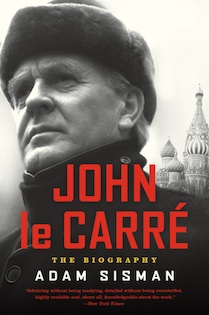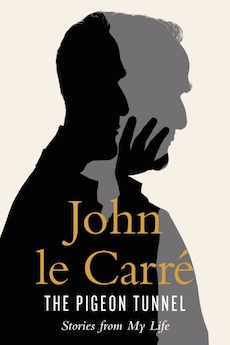
Reviewed with John Le Carré: The Biography. Adam Sisman. Harper Collins, 2015. 652 pages. $28.99.
By Allen D. Boyer
After writing twenty-three novels, some of which are masterpieces, John Le Carré – who travels in life under the name he was born with, David Cornwell – has turned to non-fiction. He has issued a volume of memoirs and overseen the publication of an authorized biography by the accomplished biographer Adam Sisman.
Sisman’s task was daunting: to write the life story of a man who has already told it in fiction (Le Carré’s novel A Perfect Spy), and who might trump any biography with his own follow-up volume of autobiography. Against these odds, Sisman has succeeded. He begins with family, the strict hymn-singing Cornwell family, well-known in the Baptist community of Poole on the Dorset coast. School records flesh out the chronicle of David Cornwell’s schooldays. Friends contribute recollections of Oxford and two short years spent teaching at Eton, and give Ann Sharp Cornwell, the author’s first wife, the attention she has long deserved. When it comes to Le Carré’s time with the British Army, Security Service, and Secret Intelligence Service, Sisman must often rely on the author’s own veiled recollections. He knows to be wary, and picks holes in some of the stories that Le Carré has retailed over the years.
The last half of the biography, which must cover thirty-odd years and more than a dozen novels, is measured and business-like. Like George Smiley leafing through the file of Operation Testify, Sisman explores Le Carré’s correspondence. The details here are of a best-selling novelist’s career: book contracts, agents, publishers, and skirmishes with Her Majesty’s Inland Revenue. Le Carré required that Sisman show “due respect to the sensitivities of living third parties.” This may explain certain guarded, protective passages:
“In Jane [his second wife], David had found a helpmeet, a companion, who would support and encourage him . . . . The restless, self-destructive search for love is part of his nature. It has led him into impulsive, driven, short-lived affairs; none of them has threatened the stability of his relationship with Jane . . . . For him, she would always be his best friend, his wise counsel and his anchor throughout every storm.”
Le Carré has spoken often of his “German muse.” (He draws titles and themes from Schiller, and the cipher used by his doppelgänger Magnus Pym is based on Simplicissimus, the story of a youth engulfed by The Thirty Years’ War, a metaphor hidden in plain sight.) His memoirs highlight his grounding in German culture. He recalls Bonn during the Cold War era, where he served – officially as a diplomat, but covertly watching right-wing political groups. He remains awed that Fritz Lang wanted to film his second novel, A Murder of Quality, and he does not regret counseling Stanley Kubrick to film Eyes Wide Shut in a continental walled city, to capture the Viennese claustrophobia of Arthur Schnitzler’s Traumnovelle.
A flamboyant, sinister figure overshadows both these books: the writer’s father Ronnie Cornwell. Ronnie became Rick Pym in A Perfect Spy. He was a conman, Le Carré knows: “a performance addict, a shameless pulpit orator.” Ronnie was equally likely to park his children at boarding school, leaving their fees unpaid, or to pull them through a whirlwind blur of casinos, racetracks, bankruptcy courts, and prison. He ran through the savings of countless lonely women and trusting souls, starting with his own widowed mother. We was all bent, son, one of his minions explained, but your dad was very, very bent indeed. “Ronnie wrecked as he created,” Le Carré writes.
“Ronnie the conman could spin you a story out of the air, sketch in a character who does not exist, and paint a golden opportunity where there wasn’t one. He could blind you with bogus detail . . . . He could withhold a great secret on grounds of confidentiality, then whisper it to your ear alone because he has decided to trust you. And if all that isn’t part and parcel of the writer’s art, tell me what is.”
Le Carré talks more about his father than about himself. Or does he talk about his father as a way of talking about himself?
The Pigeon Tunnel refers to a shooting-range contraption at Monte Carlo: tunnels under the lawn through which trapped pigeons made their way, eventually to emerge and take flight, “targets for well-lunched sporting gentlemen who were standing or lying in wait with their shotguns.” Pigeons that escaped the sportsmen’s birdshot flew home to the casino roof – where they were soon trapped again. Le Carré calls on readers to explain why the image haunts him. Those who know his fiction may take up that challenge. They will understand that a writer who has shown himself sympathetic and generous, as well as clever and urbane, would have been troubled by the cruelty of this sport. And they may see the pigeon tunnel as a metaphor for spies who cannot leave off spying, and for spymasters who send agents into harm’s way, and for the stoic effort of the novelist who knows that the market is incalculable and uncaring and yet cannot do other than write books and launch them into that uncertainty.
David Cornwell, now in old age, claims to have “no god but landscape.” His novels profess a different faith. He distrusts the world and honors the faithful. He knows that fools and villains prosper, but he sympathizes with those characters (often the walking wounded of secret wars) who show love, fortitude, loyalty, and charity, traditional Christian virtues. During the filming of The Spy Who Came In From the Cold, he recalls, Richard Burton was drunken and manipulative, but redeemed by a “rectifying Welsh puritanism.” Of himself, he concludes that “to have had my life and be ungrateful for it would be a sin.” This language is moralistic and religious; the rhetoric is moral and traditional. If Graham Greene is a Catholic writer, Le Carré may count as a Protestant novelist.
Allen D. Boyer (ΦBK, Vanderbilt University, 1977) is a lawyer and writer in New York City. Vanderbilt University is home to the Alpha of Tennessee Chapter of Phi Beta Kappa.




